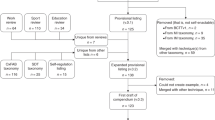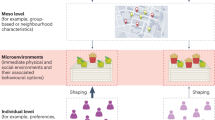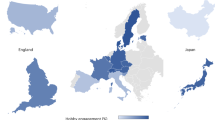Abstract
An important goal of health promotion is to make it easier for people to make healthy choices. However, this may be difficult if people do not feel control over their environment and their personal circumstances. An important concept in relation to this is empowerment. Health professionals are expected to facilitate and enable people moving towards empowerment. In this paper, we address the question what is meant by individual empowerment. In an attempt to provide a theoretical framework, we discuss individual empowerment from a salutogenic perspective. This perspective introduces two fundamental concepts: the general resistance resources, and the sense of coherence. In addition, in order to further clarify and operationalise the concept, some factors influencing individual empowerment are identified, that is, locus of control, learned helplessness, self-efficacy and outcome expectations. These concepts find common ground in feelings of (lack of) control, but they differ in stability and changeability. We provide some suggestions how these factors can be influenced, and we discuss the meaning of the identified factors for empowering interactions between professionals and their clients. Health professionals can facilitate people to see a correspondence between their efforts and the outcomes thereof, improve and facilitate health literacy, in a relationship which can be characterised as partnership.
This is a preview of subscription content, access via your institution
Access options
Subscribe to this journal
Receive 12 print issues and online access
$259.00 per year
only $21.58 per issue
Buy this article
- Purchase on Springer Link
- Instant access to full article PDF
Prices may be subject to local taxes which are calculated during checkout
Similar content being viewed by others
References
Ajzen I & Madden TJ (1986): Prediction of goal directed behaviour: attitudes, intentions and perceived behavioural control. J. Exp. Soc. Psychol. 22, 453–474.
Antonovsky A (1979): Health, Stress and Coping. London: Jossey Bass.
Antonovsky A (1987): Unraveling the Mystery of Health: how People Manage Stress and Stay Well. San Francisco, CA: Jossey-Bass.
Bandura A (1977): Self-efficacy: toward a unifying theory of behavior change. Psychol. Rev. 84, 191–215.
Bandura A (1982): Self-efficacy mechanism in human agency. Am. Psychol. 37, 122–147.
Bandura A (1986): Social Foundations of Thought and Action; a Social Cognitive Theory. Englewood Cliffs, New York: Prentice-Hall.
Bracht N, Kingsbury L & Rissel C (1999): A five-stage community organization model for health promotion: empowerment and partnership strategies. In: Health Promotion at the Community Level: New Advances, ed. N Bracht, pp 83–104, 2nd Edition. London: Sage Publications.
Brewin CR (1982): Adaptive aspects of self-blame in coping with accidental injury. In: Attributions and Psychological Change, eds C Antaki & CR Brewin, pp 119–134. London: Academic Press.
Brewin CR (1985): Depression and causal attributions: what is their relation? Psychol. Bull. 2, 297–309.
Carver CS & Schreier MF (1998): On the Self-regulation of Behaviour. New York: Cambridge University Press.
De Vries H, Backbier E, Kok G & Dijkstra M (1995): The impact of social influence in the context of attitude, self-efficacy, intention, and previous behaviour as predictors of smoking onset. J. Appl. Soc. Psychol. 25, 237–257.
Deci EL & Ryan M (2000): The ‘What’ and ‘Why’ of goal persuits: human needs and self-determinantion of behaviour. Psychol. Inq. 11, 227–268.
Eiser JR & Van Der Pligt J (1986): Smoking cessation and smokers’ perceptions of their addiction. J. Soc. Clin. Psychol. 4, 60–70.
Eriksson M & Lindström B (2005): The reliability and validity of Antonovskys Sense of Coherence Scale, Accepted for publication. J. Ep. Com. Health 59, 460–466.
Försterling F (1986): Attributional conceptions in clinical psychology. Am. Psychol. 41, 275–285.
Freire P (1973): Education for Critical Consciousness. New York: Seabury Press.
Haish J, Ruch G & Haisch I (1985): Längerfristige Effecte attributionstherapeutiser Massnahmen bei Übergewichtigen: Auswirkungen eines Attributionestrainings auf Abnehmerfolg und Abbrecherquote bei einem 23 wöchigen Gewichtsreductions-Programm. Psychother. Med. Psychol. 35, 133–140.
Hausenblas HA, Carron AV & Mack DE (1998): Application of the theories of reasoned action and planned behaviour to exercise behaviour: a meta-analysis. J. Sport Exerc. Psychol. 19, 36–51.
Hiddink GJ, Hautvast JGAJ, Van Woerkum CMJ, Fieren CJ & Van't Hof MA (1997): Information sources and strategies of nutrition guidance used by primary care physicians. Am. J. Clin. Nutr. 65 (Suppl), S1996–S2003.
Israel BA, Checkowa BN, Schulz A & Zimmerman M (1994): Health education and community empowerment: conceptualizing and measuring perceptions of individual, organizational, and community control. Health Ed. Quart. 21, 149–170.
Kelly HH & Michela JL (1980): Attribution theory and research. Annu. Rev. Psychol. 31, 457–501.
Kobasa S (1982): The hardy personality: toward a social psychology of stress and health. In: Social Psychology of Health and Illness, eds GS Sanders & J Suls, pp 3–32. Hillsdale NJ: Erlbaum.
Kobasa SC (1993): Inquiries into hardiness. In: Handbook of Stress: Theoretical and Clinical Aspects, eds L Goldberger & S Brenznitz, pp 77–100. New York: Free Press.
Koelen MA & Van Den Ban AW (2004): Health Education and Health Promotion. Wageningen: Wageningen Academic Publishers.
Laverack G & Wallerstein N (2001): Measuring community empowerment: a fresh look at organizational domains. Health Promot. Int. 16, 179–185.
Marshall G (1991): A multidimensional analysis of internal health locus of control beliefs: separating the wheat from the chaff. J. Pers. Soc. Psychol. 61, 483–491.
Mechanic D (1999): Issues in promoting health. Soc. Sci. Med. 48, 711–718.
Niehof A (2004): A micro-ecological approach to home care for AIDS Patients. Med. Antroplogie. 16, 245–265.
Nutbeam D (1998): Health Promotion Glossary. WHO/HPR/HEP/98.1. Geneva: World Health Organisation.
Oei TPS, Ferguson S & Lee NK (1998): The differential role of alcohol expectancies and drinking refusal self-efficacy in problem and non-problem drinkers. J. Stud. Alcohol. 59, 704–711.
Pease B (2002): Rethinking empowerment: a postmodern reappraisal for emancipatory pratice. Sociale Interventie. 3, 29–45.
Perkins DD & Zimmerman MA (1995): Empowerment theory, research, and application. Am. J. Community. Psychol. 23, 569–579.
Rappaport J (1985): The power of empowerment language. Soc. Policy. 16, 15–21.
Rappaport J (1987): Terms of empowerment; examplars of prevention: toward a theory for community psychology. Am. J. Community Psychol. 15, 121–148.
Rissel C (1994): Empowerment: the holy grail of health promotion? Health Promot. Int. 9, 39–47.
Rogers RW (1983): Cognitive and physiological processes in fear appeals and atitude change: a revised theory of protection motivation. In: Social Psychology: a Source Book, eds JT Cacioppo & RE Petty, pp 153–176. New York: Guilford Press.
Rotter J (1966): Generalized expectancies for internal versus external control of reinforcement. Psychol. Monogr. 80 (1), 1–28.
Schaalma HP (1995): Planned development and evaluation of school-based AIDS/STD education. Doctoral Dissertation. Maastricht: Maastricht University.
Seligman MEP (1975): Helplessness: on depression, development and death. San Francisco: Freeman.
Siero FW (1987): Feedback en motivatie in de klas. Doctoral Dissertation. Groningen: State University Groningen.
Sutton SR (1982): Fear-arrousing communications: a critical examination of theory and research. In: Social Psychology and Behavioral Medicine, ed. JR Eiser. Chichester: John Wiley and Sons.
Tronto JC (1993): Moral Boundaries: a Political Argument for an Ethic of Care. New York, London: Routledge.
Van Dillen SME, Hiddink GJ, Koelen MA, De Graaf C & Van Woerkum CJM (2004): Identification of nutrition communication styles and strategies: a qualitative study among Dutch GPs, submitted.
Wallerstein N (1992): Powerlessness, empowerment, and health: implications for health promotion programs. Am. J. Health Promot. 6, 197–205.
Wallston KA & Wallston BS (1982): Who is responsible for your health? The construct of health locus of control. In: Social Psychology of Health and Illness, eds G Sanders & J Suls. Hillsdale, NJ: Erlbaum.
Weiner B (1986): An Attributional Theory of Motivation and Emotion. New York: Springer Verlag.
Werner EE & Smith RS (1982): Vulnerable but Invincible: a Longitudinal Study of Resilient Children and Youth. New York: McGraw-Hill.
World Health Organisation (1986): Ottawa Charter of health promotion. Copenhagen: WHO.
Zimmerman MA (2000): Empowerment theory: psychological, organizational and community levels of analysis. In: Handbook of Community Psychology eds J Rappaport & E Seidman. New York: Kluwer Academic/Plenum Publishers.
Author information
Authors and Affiliations
Corresponding author
Additional information
Abbreviated Discussion after Koelen
Rosser: In family practice, and probably in medicine at large, there is a concept that what happens between the physician and the patient is described as a partnership, where the physician is the expert, but the patient brings his own knowledge of his life; his beliefs, his values. So both partners have a set of knowledge. And you have to bring the two together to get empowerment ….
Koelen: The patient is the expert of his own beliefs.
Rosser: That is correct. The physician or health care worker does not have that expertise. If they ignore that piece of the two things having to come together then it will not be very effective.
Koelen: In the recent UK white paper, for instance ‘Making healthy choices easy choices’, the first thing is that it is the individual who is responsible for his own health and behaviour. At the same time, the individual cannot be held responsible for something that is out of his control.
Kok: You said in your talk that through interaction and communication the situation may be improved. Could you be a little bit more specific?
Koelen: I said this about partnerships. It's about taking each other seriously…. Not only being diagnostic and prescribing something. But talk with the patient more broadly about their situation. For example, doctors seem to have trouble with motivating patients to lose weight. For a doctor it may be very helpful to know why this is.
Green: In my experience the word empowerment does not travel so well in certain circles. The term self-efficacy communicates about the same thing. What in your mind is the essential difference?
Koelen: Empowerment is something more enduring. Self-efficacy is a part of empowerment. So empowered people will have higher levels of self-efficacy. Self-efficacy is more related to a certain type of experience or behaviour. I can feel very effective in changing my diet but not in my ability to take up physical exercise. A lot of success experience can lead to higher feelings of self-efficacy and to the opposite of learned helplessness, and that is learned hopefulness.
Truswell: There is a relation between someone's position in society and his feelings of empowerment. There must be a lot of people in our societies who have no control over their own lives, while others have a lot of control.
Koelen: That is true, and this affects the learned helplessness.
Helman: Whether the concept of learned helplessness applies to the family physician needs to be explored. In my experience they are quite willing to refer the patient to the dietician, who seems to be quite optimistic on their possibility to help the patient lose weight. Perhaps they don't observe the obstacles so much. Can we do something to change the attitude of family physicians?
Koelen: General physicians are people. So everything we say about patients will also apply to GPs. So, we could learn a lot from social science.
Rosser: A colleague of mine wrote an article in the Canadian Family Physician that family physicians suffer from learned helplessness professionally; not just in diet counselling, but basically that they were conditioned in medical school that specialists were the ones to look after most conditions, and therefore they should refer everybody that had anything more than a minor condition, and also that they do not really need to research or understand what they do, because it's all done by somebody else. This is something to remember when empowering family physicians to take on health promotion.
Van Weel: Do you think people who feel empowered have a more healthy life? Our government strongly believes that if you make patients responsible for their own health you will reduce health costs.
Koelen: People who are more empowered do not necessarily behave more healthily….. People who are more empowered can take better control over their own life. But this can be in a more healthy way or in a less healthy way.
Rights and permissions
About this article
Cite this article
Koelen, M., Lindström, B. Making healthy choices easy choices: the role of empowerment. Eur J Clin Nutr 59 (Suppl 1), S10–S16 (2005). https://doi.org/10.1038/sj.ejcn.1602168
Published:
Issue Date:
DOI: https://doi.org/10.1038/sj.ejcn.1602168
Keywords
This article is cited by
-
The Role of Maternal Empowerment during Pregnancy in Predicting Parent and Infant Outcomes among Working Women
Journal of Child and Family Studies (2024)
-
Healthcare providers’ and policymakers’ experiences and perspectives on barriers and facilitators to chronic disease self-management for people living with hypertension and diabetes in Cameroon
BMC Primary Care (2022)
-
Evaluating ‘Power 4 a Healthy Pregnancy’ (P4HP) – protocol for a cluster randomized controlled trial and process evaluation to empower pregnant women towards improved diet quality
BMC Public Health (2022)
-
Qualitative, longitudinal exploration of coping strategies and factors facilitating infant and young child feeding practices among mothers in rural Rwanda
BMC Public Health (2021)
-
Locus of control moderates the association of COVID-19 stress and general mental distress: results of a Norwegian and a German-speaking cross-sectional survey
BMC Psychiatry (2021)



